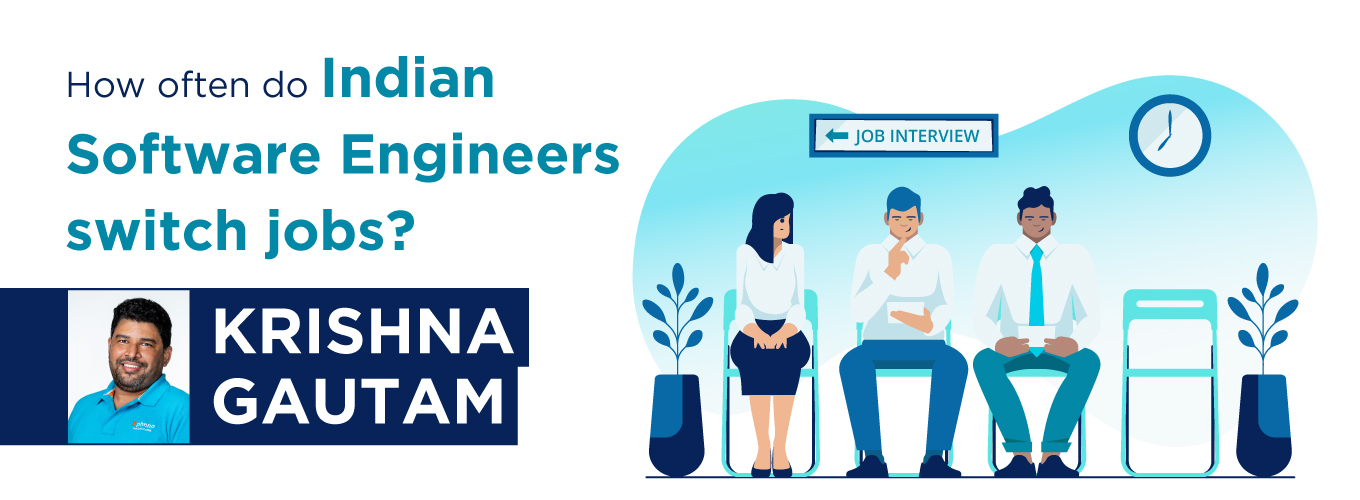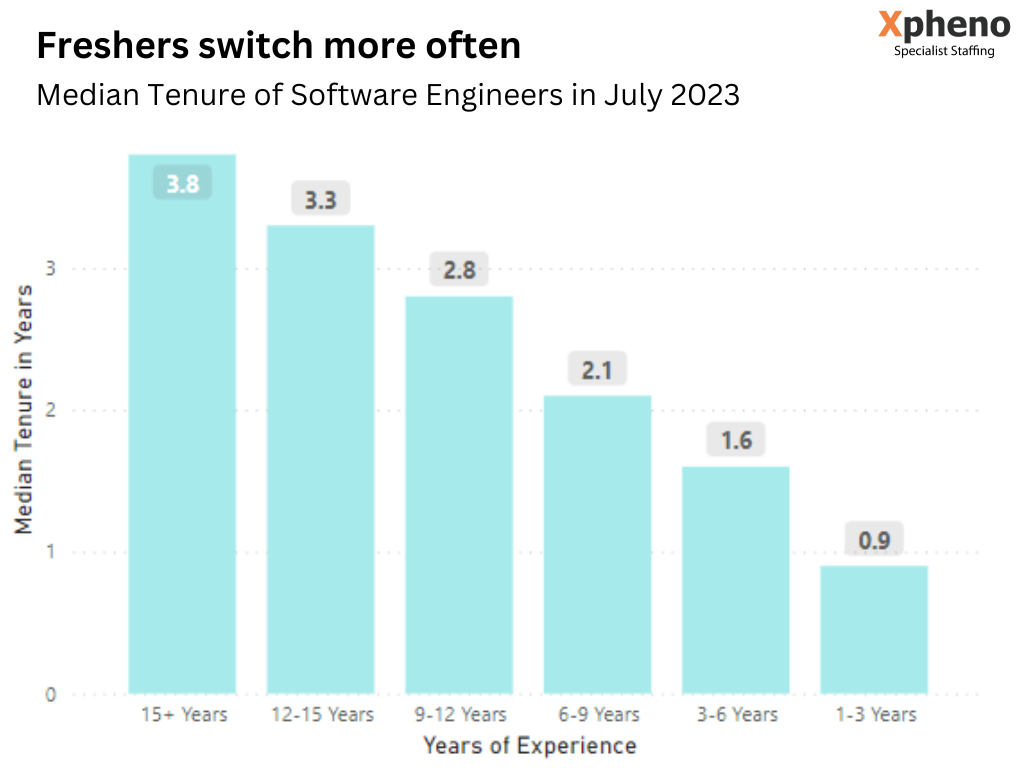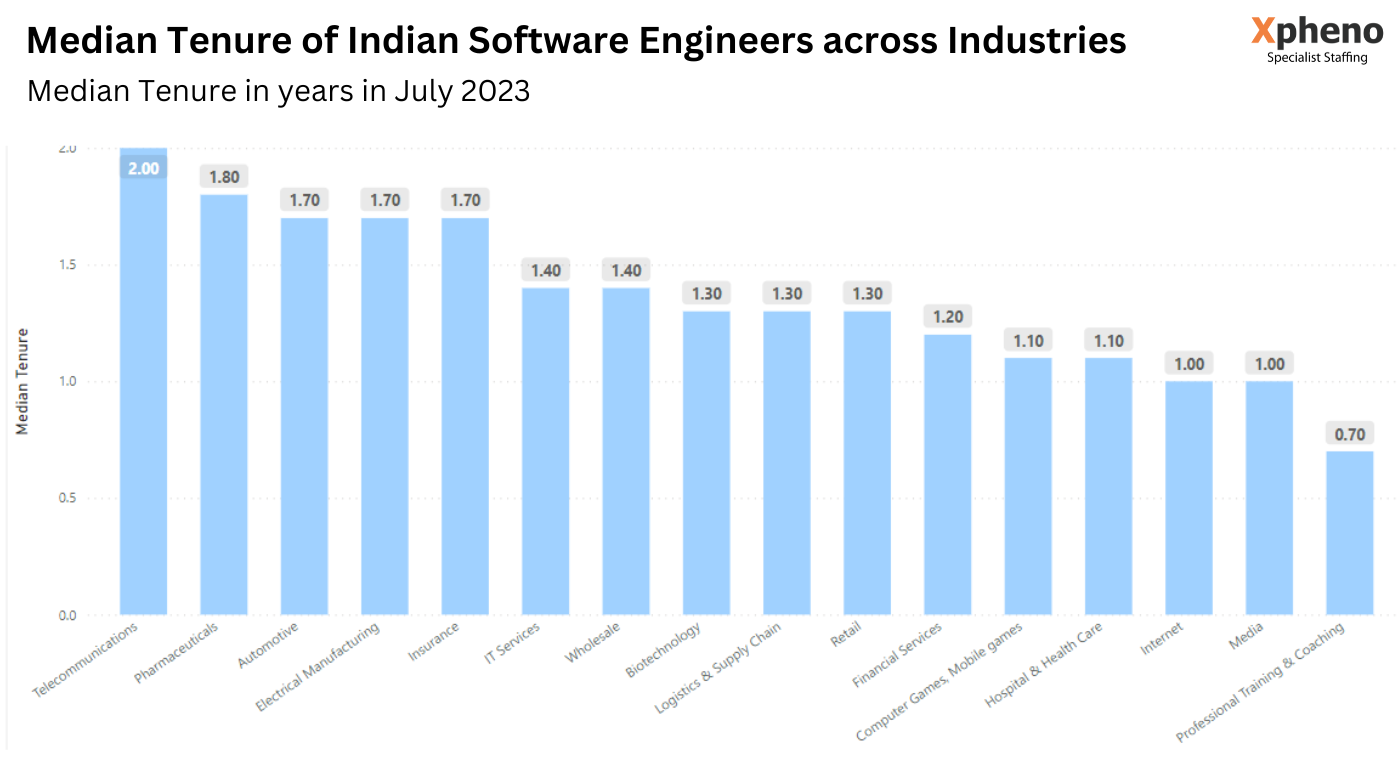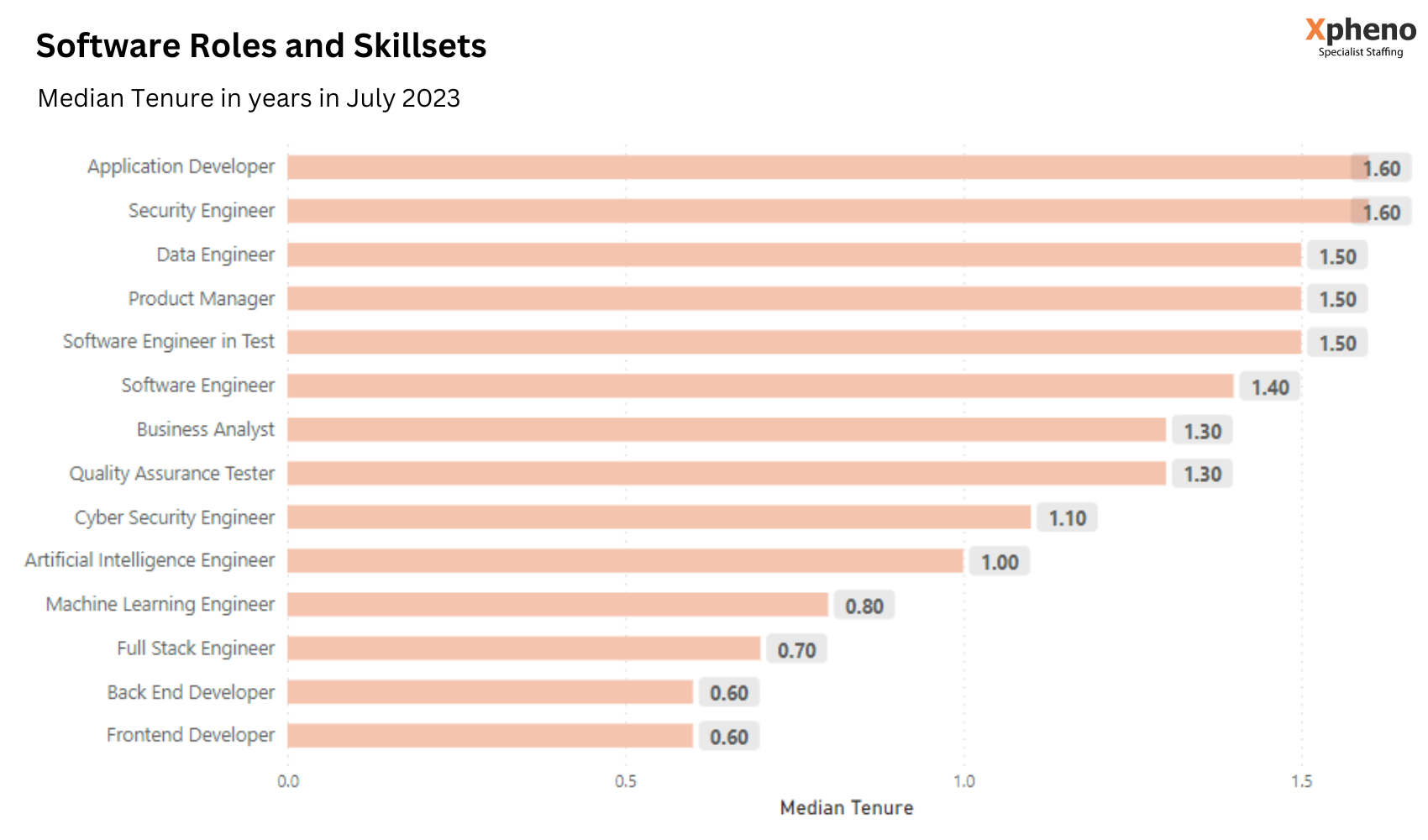How often do Indian Software Engineers switch jobs?
Businesses of all sizes across the globe are grappling with tech talent shortage. Incase of software engineers, it has become even more challenging to retain talent than it is to hire them.
Engineering openings grew by 11% in July 2023, after a 13% growth in June 2023. The Indian IT Services, Software Products and Tech Startups have been a dominant cohort in the job market for Software Engineers. 9 Indian IT Bellwethers alone employ 15 lakh software professionals.
At the same time, according to LinkedIn, the IT industry also experiences the highest turnover rate among all industries, reaching 13.2%. Despite tech giants offering attractive packages to attract software engineers, many of these companies struggle to retain their software talent for a long period after recruitment.
Switching jobs can be a good way to gain skills from various industries and take on a fresh challenge. However, ample job opportunities and industry’s strong demand for their skills prompt software engineers to change jobs quicker than ever before.
Freshers Switch More Often:
Freshers were found to have shorter median tenure than experienced professionals. This isn’t new. However, as organizations pace up their digital transformation journey, quick quitting has become more common among the freshers segment who are easily lured by higher offers. On the other hand, experienced software engineers have more stable tenures.
The image below shows the increasing trend of median tenures along with the increase in experience level of software engineers in India.
Earlier in the career, professionals tend to have a massive drive to earn more and gain experience across different domains. This could be a reason for the job-hopping trend in freshers. As they progress in their professional journey, their priorities shift. They start to care more and more about the company’s management, strategic plan, organizational culture and their scope of work.
Enterprises need to build their talent attraction and retention strategy tailored to the seniority-levels of their software talent. (More on that later)
Industry Trends & Insights:
Software talent has become critical to success in most industries today. Yet, industries with massive demand for software talent have different employee turnover and quit rates.
This year, Telecommunications, Pharmaceuticals, Automotive, Electrical and Electronic Manufacturing and Insurance are witnessing high ranges in median tenures of Software Engineers. IT Services, Biotechnology and Wholesale have slightly above average median tenures.
However, Software Engineers in the Internet, Gaming, Financial Services, Media, Logistics, Professional Training and Coaching, and Hospital and Healthcare are in the lower range for now.
Industries spanning automobiles, textiles, utilities, and apparel are all embracing software to improve product design, cut costs, speed up development, and boost overall agility. All these industries have different skills demands from software talent.
However, the current job market has become challenging for industries that develop a bad reputation with excessive crunch-time, frequent lay-offs, low pay relative to other industries, and unrealistic expectations.
Software engineers understand how important their role is in helping industries provide the right products and services at the perfect time. Industry players with good work environments will always hold the advantage in retaining their talent for longer periods.
Tenures vary with diverse software roles and skill sets:
Software Engineers maintain a median tenure of 1.4 years, with Business Analysts, Frontend and Backend Developers, and Quality Assurance Testers showing even shorter median tenures. Generally, for Software Engineers and these adjacent roles it is recommended to acquire skills from diverse industries. Niche roles like AI/ML Engineers and Cybersecurity Engineers also have shorter median tenures compared to Software Engineers.
On the other hand, App Developers, Data Engineers, Security Engineers, SDET and Product Managers have higher median tenures. This can be attributed to the demands of their work which require a comprehensive grasp of the entire software cycle, the continuous integration and delivery processes.
Why do Software Engineers switch jobs?
Though the median tenure of software engineers in India is 1.4 years, popular belief is that 2 years is the average time to get the most learning at a given role/team/techstack. A research by Hired, indicated that 61% of software engineers have made a job switch within the past two years. In contrast, only 16% have remained with the same employer for over five years.
Switching companies or industries frequently has become a convenient way to experience the broader business world and negotiate more pay.
Higher compensation, lack of growth opportunities and desire for a new challenge can all be reasons for engineers to switch. Cultural fitment and lack of recognition are some more reasons for professionals to leave an organization. Especially, Millennials and Gen Z are more open to accepting unexpected job offers if they come with better pay and benefits.
Pitfalls of frequent job hops for Software Engineers:
While job hopping is relatively commonplace nowadays, and there can be valid reasons for seeking new opportunities, it’s crucial to explore the pitfalls associated with this practice:
Question on commitment:
The primary concern is the perceived lack of commitment. Recruiters and prospective employers are often wary of candidates with short tenures. It makes them question the candidate’s dedication to a project’s long-term success. Having a track record of job hopping can inadvertently impact software professionals’ chances of securing impactful and challenging roles in good organizations.
Skill Development Disrupted:
Constant job changes can hinder the development of deep expertise. Software professional require a thorough understanding of niche technology stacks, domains, or products to thrive in any industry.
Frequent switches might limit the engineer’s capacity to master the intricacies of a particular field, potentially constraining their career growth in the long run. As mentioned above, stability is even more important for roles that need a thorough understanding of the complete software lifecycle and the continuous integration and delivery processes.
From an organizational perspective, constant turnover can disrupt project continuity. Software development projects often require consistent collaboration and knowledge sharing among team members. Frequent job hops could undermine team cohesion and hinder the seamless flow of ideas and information.
Immediate Vs long term gains:
While short-term raises or signing bonuses might be appealing, the cumulative effect of multiple job changes can hinder long-term earning potential of a professional. Companies often offer more substantial compensation packages to employees who exhibit loyalty and commitment.
Weaving a Limited Web:
Finally, building a strong professional network takes time and consistent interactions. Frequent job changes could limit the opportunity to establish lasting relationships within the industry, which often play a crucial role in career advancement.
Bottomline:
India’s expanding tech workforce has become the base to help India grow as a talent powerhouse. It’s driving growth of industries like BFSI, Automotive, Banking, Retail, Pharma, Energy, telecom and many more. Especially, in the Indian IT service bellwethers, startups and GCCs, the demand has been increasing year on year. Software talent is exploring new opportunities in the innovation centers being established in India. They have the chance to work on bigger projects with better compensation.
GCCs, Consulting firms, IT Service Bellwethers and new-age funded startups are all hiring the same pool of software engineers. They are luring talent with sky-high salaries, flexible work hours, employee stock options (ESOPs), massive salary hikes and attractive offers like holiday packages, gadgets and sportsbikes.
While exploring new opportunities is healthy, software engineers should be mindful of the potential pitfalls associated with frequent job hopping. Striking a balance between career growth, commitment, and expertise development can lead to a more fulfilling and successful journey in the dynamic world of Software Engineering.












